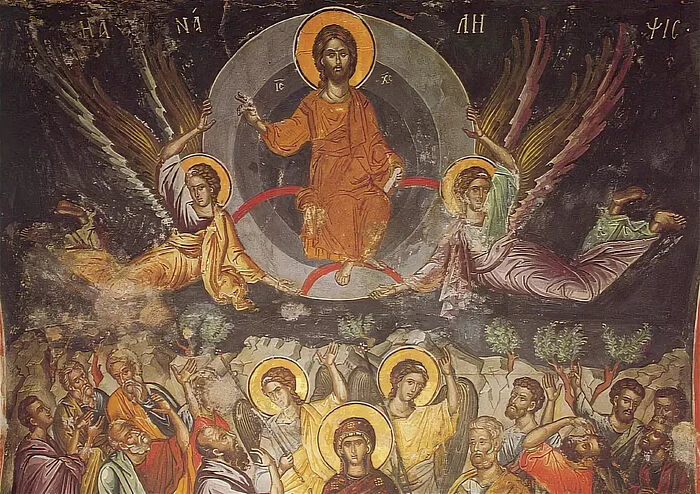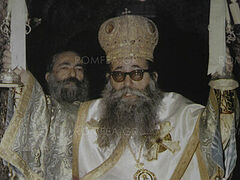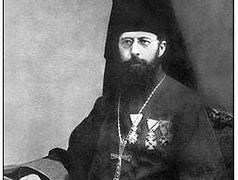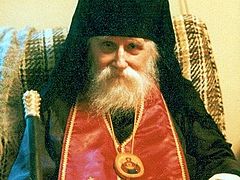On this Leavetaking of the feast of the Ascension, we present a homily of Metropolitan Augustinos (Kantiotis) of Florina (1907-2010), a well-known archpastor and spiritual writer, dedicated to this feast, delivered by His Eminence in the Church of St. Athanasius in the village of Amyntaio, Greece, on June 12, 1986.
Today, my beloved, we celebrate the Ascension of the Lord. This is known as a feast of the Lord because on this day we glorify our Lord Jesus Christ with special solemnity. St. Kosmas of Aetolia called Him our “Sweetest Lord and Master”—such beautiful words!
He holds the keys to life and death in His hands. He is the Alpha and Omega, the beginning and the end (Rev. 21:6)—our Lord Almighty, the Master Christ.
This feast of the Lord has come. Following the Nativity, the Circumcision of the Lord, the Meeting of the Lord, and the Crucifixion and Resurrection of Christ, we celebrate the Ascension.
What is the Ascension? After His Resurrection, Christ remained on earth for forty days and then ascended to Heaven. The day before, we celebrated the Leavetaking of Pascha, and we heard the “Christ is Risen” Paschal troparion, with which Christians once greeted one another every day from Pascha to Ascension, for the last time. Now, unfortunately, the beautiful customs of our ancestors are being forgotten and fading into the past.
Forty days after the Resurrection, Christ commanded His disciples to go up to the Mount of Olives, so called because it was all planted with olive trees. There he arranged a place for them to meet. On this holy day, 120 believers gathered on the summit of the mountain. There were so few of them, but what people they were! The entire world today isn’t worth just one of them. The first among them was the Most Holy Theotokos, then the eleven Apostles (Judas had committed suicide), then the Myrrh-bearing Women, and, finally, all the rest, 120 in all. This was the first Church, the dearest souls, beyond all worth.
And Christ met with them there. He gave them His final words and blessed them. If only you knew what the blessing of Christ is! What a great thing it is! Never neglect the blessing of a priest. During the services, it’s no longer just Fr. George, Fr. Stavros, Fr. Peter, or Fr. Augustinos—we’re all sinners. When a priest serves in a church in liturgical vestments, Christ Himself acts through him! Take the antidoron, get a blessing from the priest, and the Lord will be with you, wherever you are: on the river, in the desert, in a dense forest, at sea, or in the middle of the endless ocean.
The blessing of Christ is more precious than all the riches of the world. Always try to get a blessing from the priest.
Christ blessed them, and then something amazing happened. Let the unbelievers doubt—it’s their right; but we believe that it was so. The blessed feet of Christ, with which He walked this sinful earth from village to village, city to city, mountain to mountain for three whole years; the feet that were, in the end, nailed to the Cross, were lifted up above the earth. Soon they will no longer walk the earth: Christ is ascending, ascending to Heaven…
Does that seem strange to you? What’s the big deal? Look at the eagle on the rocks. It suddenly flaps its wings and begins to rise into the sky; it reaches such a height that from the ground it looks like a small dot to us. Is it really difficult for Christ, the Son of God, Who gave the eagle the power to soar in the heavens, to raise Himself to the heights? If you read the Revelation of St. John the Theologian, you’ll see that Christ is called the “great eagle” (Rev. 12:14). So Christ was lifted up from the earth, and the disciples fixed their gaze upon Him, watching Him ascend to Heaven.
Then two white-robed angels appeared and said to them: “Why are you standing, looking up into Heaven? Don’t be upset, but be assured that just as Christ ascended into Heaven, so He will return to earth again.” This is what our holy Church believes, and this is what we confess in the Nicene Creed: “And ascended into Heaven, and sittest at the right hand of the Father. And He shall come again with glory to judge the living and the dead, Whose Kingdom shall have no end.”
This is the story of this holy feast. What do we learn from it? Many things.
Above all, my dears, it becomes clear to us that on the scale of the whole universe, the earth is nothing more than a child’s sandbox. If you saw two people killing each other over a sandbox, what would you say? How stupid! The earth is not our permanent residence. It is our temporary shelter, our “hotel.” If you have to spend the night in a hotel during a trip, you won’t want to stay there forever, but look forward to returning home. The same goes for this earth. We are but guests here. And just like guests in a hotel, one person lives there today, and tomorrow another. We will all depart this temporary life. No one lives on earth forever, for we have no continuing city, but we seek one to come (Heb. 13:14); we are strangers and pilgrims on the earth (Heb. 11:13).
So what are we waiting for? Our permanent home is in Heaven. We were created not for the earthly and vain, the small and insignificant, but for Heaven. The proof of this is the very appearance of a man. Animals walk on all fours, their gaze turned towards the ground, but man stands upright with head held high. Why? In order to see Heaven. The wonderful ancient Greek word “ἄνθρωπος (anthropos)” means, “he who looks up into the sky.” A philosopher was once asked: “Where is your homeland?” He didn’t respond all day, but kept asking them to wait, as if testing their patience. But really, he was waiting for night. When it turned dark and the stars appeared, he pointed to the sky and said: “My homeland is there!” We are created for Heaven. This is why man is made so that his eyes look up—that he might see the greatness of God and say: The heavens declare the glory of God; and the firmament sheweth His handywork (Ps. 18:2).
But when we speak of “Heaven,” what do we mean? Heaven is not just what we see with our eyes. There is also the “Heaven of heavens” (cf. Deut. 10:14, Ps. 67:34, 112:24, 148:4, Sir. 16:18). That beautiful sky, where the sun is visible during the day and the moon and stars at night, and the galaxies and comets, is part of the nature around us. And one day it will disappear. But there is another Heaven—imperishable, eternal, the Heaven of indescribable beauty.
What is it? It’s the spiritual Heaven, or the “third Heaven,” to which the Apostle Paul was taken up (2 Cor. 12:2). And just as in our natural, visible sky there is the sun, moon, and stars, so in the spiritual, invisible Heaven there is the Unsetting Sun—our Lord Jesus Christ; the moon is the Most Holy Theotokos, and the shining stars are our saints. This is what we must strive for, my brothers.
Beloved ones! The Divine Liturgy that we celebrate presents to our mind’s eye the entire mystery of the Divine economy. We recall the Nativity of Christ, His coming into the world as Teacher, the Mystical Supper, the Crucifixion, the Resurrection, and, finally, at every Divine Liturgy, also the Ascension of the Lord. Which moments remind us of the Ascension? When after the Great Entrance and the Creed, the priest proclaims: “Let us lift up our hearts!” This is what this means: As Christ ascended into Heaven, thus we must turn our hearts to Heaven and seek the Lord with all our souls.
Imagine that someone you love and care about is in Australia, or in America, and you think about him constantly, both day and night—thus all our thoughts must be turned to Christ. For our citizenship is in Heaven (Phil. 3:20). Nearer to the end of the Liturgy, after Holy Communion, the priest says, “Be thou exalted, O God, above the heavens, and Thy glory above all the earth” (Ps. 56:6), which also suggests the Ascension.
Let us not cling to the earthly and perishable. Let us follow the Ascended Christ on eagle wings of faith; let us ascend to the spiritual Heaven; because otherwise, “the swamp will devour us,” as one poet says. In earlier times, simple and honest people lived in poor huts, like angels on earth. And now, unintelligent brutes and evil demons live in luxurious mansions.
The pig drops its head down, looking for acorns; and finding a beautiful pearl, it tramples it under foot, as Christ told us (Mt. 7:6). What does the pig love? To wallow in filth. In the same way, we despise the words of the Lord, and like pigs, we strive for the swamp of moral filth and stench. The pig sees the sky but once: when the butcher turns it on its back for slaughter. The same goes for the beast-like man. When the archangel appears with a sword to remove his soul from his body, only then does he first raise his mind and see that beyond this vain world there is another—eternal—life.
Dear brothers and sisters! Just as you are sure that this visible world exists in reality, so firmly believe that there is another, as yet invisible world. And we are going to this world. “Let us lift up our hearts!”




